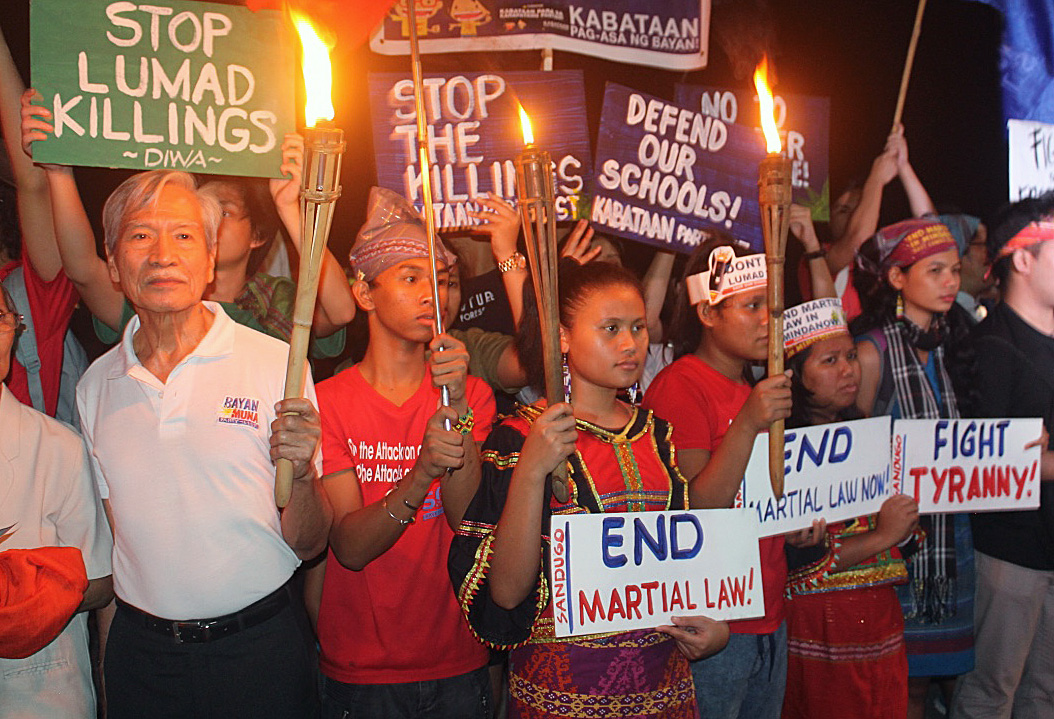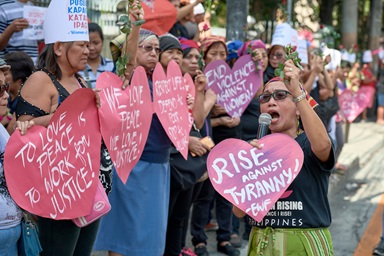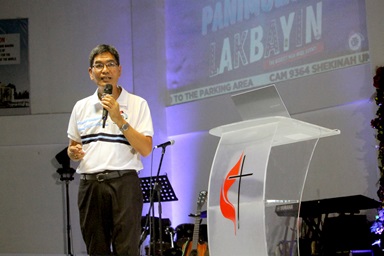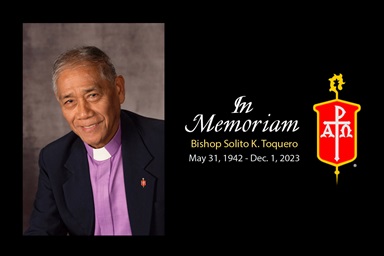When United Methodists joined thousands of interfaith participants rallying at Rajah Sulayman Plaza in Manila recently, it was just the latest effort to call attention to human rights violations in the Philippines.
Church members, concerned about the escalation of threats and violent incidents, are seeking God’s wisdom and strength through prayer, said the Rev. Reynaldo Hernandez of Living Word United Methodist Church in Marikina City, Metro Manila.
“With the prevailing context of violence in our country, many Filipino people are anxious that the situation could get worse,” he explained.
Hernandez was one of about 100 United Methodists who gathered for prayer at the Philippine Christian University Auditorium before joining the Manila rally Jan. 25.
“Our voice may be in wilderness, but today is the time to show our prophetic witness,” Manila Area Bishop Ciriaco Q. Francisco said at the event.
He also read a statement released that day by the United Methodist College of Bishops in response to issues of injustice and violence in the Philippines.
“We join in solidarity with our people who are dwelling and sitting in darkness, and yet are seeing a bright light,” the statement said in part. “As one people living and walking in this land covered by the dark shadow of death, with the widespread and wanton killings of the poor and the attacks on the defenders of human rights, attacks on labor unions, on lawyers, on teachers, on peasants, on media, and on the religious and clergy — light has dawned.”
Dubbed as “One Faith, One Nation, One Voice: A Gathering for Truth, Justice and Peace,” the rally was organized by the Catholic Bishops’ Conference of the Philippines and the National Council of Churches in the Philippines. Participants denounced human rights violations through music, testimonies, creative movement, spoken poetry, candle lighting and ringing of the bells.
Retired United Methodist Bishop Solito K. Toquero, who attended the event, spoke about the need “to be together so we can overcome our overwhelming problems.”
Armin Luistro, a De La Salle brother and a former Education Secretary for the Philippines government, told United Methodist News Service that it is “high time” for the church to take a stand.
“The church has been silent too long and our usual prayers and patience will not work anymore,” he said. “This is about the many people who are being maligned, put to jail and are oppressed.”
Satur Ocampo, a well-known social activist, commended the interfaith initiative, calling it “a signal that society should not remain silent in the face of such exigencies.”
The Rev. Kakay Pamaran, a professor at Union Theological Seminary, said that the role of the church shall be very public and shall serve as a moral compass. “In and around issues of peace and justice under attack, I believe the church should be the first to stand,” she said.
“I know God is calling me to be with other people of faith, to pray for our country,” said the Rev. Helen Cunanan-Manalac, a United Methodist pastor.
The day after the Manila rally, two bombs tore through a Roman Catholic cathedral during Sunday mass on the island of Jolo in Mindanao, killing at least 20 people and wounding 111 others. The Islamic State has claimed responsibility. Three days later, a grenade attack on a mosque in the city of Zamboanga resulted in two deaths.
Speaking before the mosque attack, United Methodist Bishop Rodolfo A. Juan of the Davao area strongly condemned the cathedral bombings and called upon Muslim extremists “to desist from sowing terror, especially in sacred places.” The bishop appealed to the Philippines President Rodrigo Duterte, the military and police officers to exert all efforts for peace negotiations.
The World Council of Churches also condemned the cathedral attack and appealed to Duterte, religious leaders and to governments across the region “to act swiftly and boldly to safeguard the fundamental religious rights of worshippers of all faiths, to ensure security in the face of violence and to guarantee justice for all people.”
In June, the council’s Central Committee had issued a statement expressing alarm about “the worsening human rights situation and increasing violence and impunity” in the Philippines, urging its government to take corrective actions.
Some church members standing up for the rights of others have been harassed or attacked. The Board of Church and Society of The United Methodist Church in the Philippines has released a statement on the attempted killing of the Rev. Marvin De Leon of MC Navia Sr. Memorial United Methodist Church in Bulacan in December 2018.
Signed by Genesis Antonio, the board chairperson, the statement said the attempt occurred while De Leon — reportedly active in supporting the workers, fishing communities and others affected by plans for an international airport in Bulacan — was riding his motorcycle in a secluded area.
When he saw another motorcycle pull up behind him and the man behind the driver pull out a gun, De Leon “ducked and stopped his motorcycle,” the statement said. The bullet apparently hit the back of De Leon’s helmet but he survived the assault.
The statement from the United Methodist group condemned the intimidation and harassment. “We strongly reject and condemn domestic surveillance and intimidation of political opponents,” it said. “The elimination of human rights defenders or other dissidents violates fundamental human rights.”
Ephraim B. Cortez, a United Methodist lawyer, offered a similar message when he spoke to some 1,000 students during a recent forum on defending human rights at Wesleyan University-Philippines in Cabanatuan City.
Cortez read a message from former Chief Justice Reynato Puno, a United Methodist layperson, which included remarks the chief justice had made to the Congress of the National Union of Peoples’ Lawyers.
“By calling yourself the ‘people’s lawyers,’ you have made a remarkable choice. You decided not to remain on the sidelines,” Puno had told that group.
“Where human rights are assaulted, you have chosen to sacrifice the comfort of the fence for the dangers of the battlefield. But only those who choose to fight on the battlefield live beyond irrelevance.”
Mangiduyos is a communicator from the Philippines. News media contact: Vicki Brown, news editor, newsdesk@umcom.org or 615-742-5470. To read more United Methodist news, subscribe to the free Daily or Weekly Digests.
Like what you're reading? Support the ministry of UM News! Your support ensures the latest denominational news, dynamic stories and informative articles will continue to connect our global community. Make a tax-deductible donation at ResourceUMC.org/GiveUMCom.




